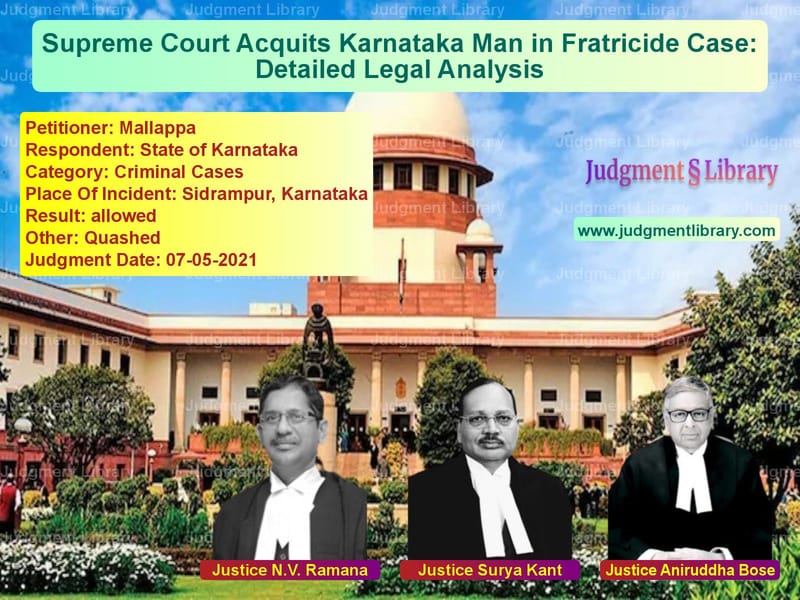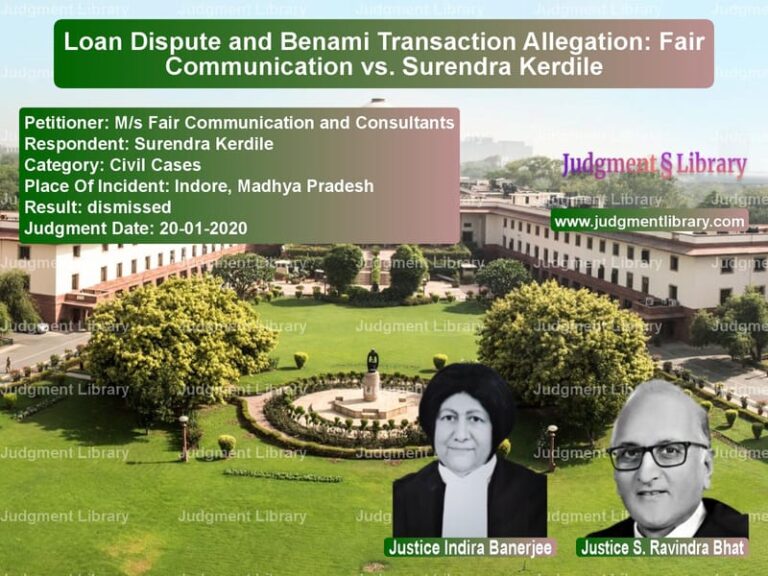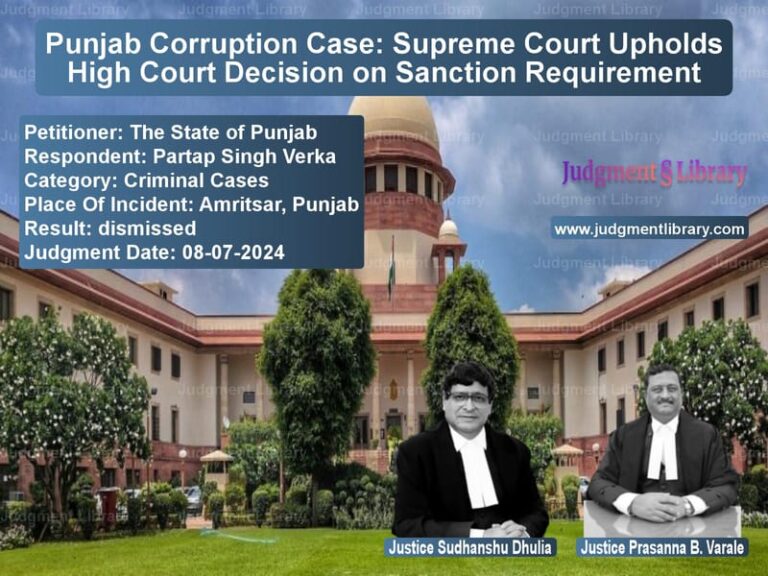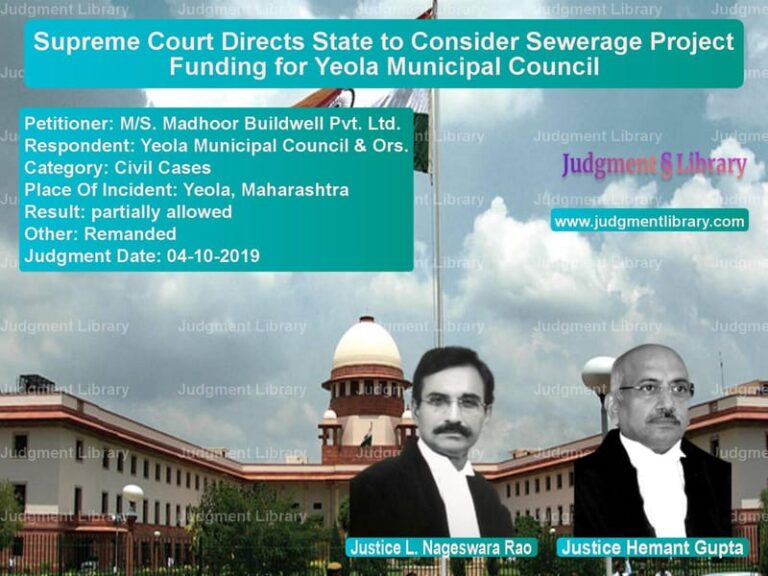Supreme Court Acquits Karnataka Man in Fratricide Case: Detailed Legal Analysis
The Supreme Court of India, in a landmark ruling on May 7, 2021, acquitted Mallappa, a resident of Sidrampur, Karnataka, who had been convicted of murdering his own brother, Earappa. This case, which spanned over two decades, raised crucial questions about the credibility of eyewitness testimony, the reliance on circumstantial evidence, and the scope of appellate courts in overturning acquittals. The Supreme Court’s verdict reaffirmed the fundamental principles of criminal jurisprudence—presumption of innocence, burden of proof, and the need for conclusive evidence.
Background of the Case
The case stemmed from an incident on the night of April 19-20, 1999, when Earappa was found dead outside his house with severe head injuries. The prosecution alleged that Mallappa and his son, Veeresh, had attacked Earappa with a wooden club due to a longstanding property and water-sharing dispute between the two brothers. Based on witness testimonies and circumstantial evidence, the Karnataka High Court convicted Mallappa, reversing the trial court’s acquittal. However, the Supreme Court ultimately reinstated the acquittal.
Key Legal Issues
- Did the prosecution establish guilt beyond a reasonable doubt?
- Were the eyewitness testimonies credible and corroborated by forensic evidence?
- Did the High Court err in reversing the trial court’s acquittal?
- Was circumstantial evidence sufficient to sustain the conviction?
Arguments by the Prosecution
- The prosecution alleged that Mallappa and Veeresh attacked Earappa while he was sleeping.
- PW-5 (Bassamma), the main eyewitness, testified that she saw Mallappa striking Earappa’s head with a club.
- PW-3 and PW-6 stated they saw the accused fleeing the crime scene.
- A wooden club, allegedly bearing bloodstains, was recovered from Mallappa’s house.
- The accused had a strong motive due to the ongoing property dispute.
Arguments by the Defense
- The trial court had rightly acquitted Mallappa due to a lack of direct evidence.
- PW-5’s testimony was inconsistent—she initially claimed she saw the attack but later stated she only saw the accused fleeing.
- The forensic report did not conclusively establish that the wooden club was the murder weapon.
- The High Court had no compelling reasons to overturn the acquittal.
Supreme Court’s Observations
1. Reliability of Eyewitness Testimony
The Supreme Court found inconsistencies in PW-5’s statements:
“Her statements varied between witnessing the assault and merely seeing the accused running away. Such contradictions undermine her credibility.”
2. Burden of Proof and Circumstantial Evidence
The Court reiterated that circumstantial evidence must be conclusive:
“The prosecution must establish guilt beyond reasonable doubt. Mere presence near the crime scene is insufficient.”
3. Forensic and Medical Evidence
The forensic report did not conclusively link the wooden club to the murder:
“The prosecution’s failure to provide conclusive forensic proof weakens the case against the accused.”
4. High Court’s Overreach in Reversing Acquittal
The Supreme Court criticized the High Court’s decision to convict Mallappa:
“The trial court’s judgment was based on a fair appreciation of evidence. The High Court’s intervention was unwarranted in the absence of compelling reasons.”
5. The Presumption of Innocence
The Court emphasized that an acquittal should not be reversed unless there is clear evidence of an error:
“The presumption of innocence is fundamental to criminal law. Reversal of an acquittal requires substantial and compelling reasons.”
Final Judgment
The Supreme Court acquitted Mallappa, stating:
“We restore the trial court’s judgment. The appellant is acquitted of all charges.”
Impact of the Judgment
- Reaffirmed that appellate courts must exercise restraint while reversing acquittals.
- Emphasized the importance of consistency in eyewitness testimony.
- Clarified that circumstantial evidence alone must meet a high standard to sustain a conviction.
Conclusion
The Supreme Court’s decision in Mallappa’s case serves as an important precedent for criminal law. It reinforces the necessity of direct and reliable evidence, ensuring that mere suspicion does not lead to wrongful convictions.
Petitioner Name: Mallappa.Respondent Name: State of Karnataka.Judgment By: Justice N.V. Ramana, Justice Surya Kant, Justice Aniruddha Bose.Place Of Incident: Sidrampur, Karnataka.Judgment Date: 07-05-2021.
Don’t miss out on the full details! Download the complete judgment in PDF format below and gain valuable insights instantly!
Download Judgment: mallappa-vs-state-of-karnataka-supreme-court-of-india-judgment-dated-07-05-2021.pdf
Directly Download Judgment: Directly download this Judgment
See all petitions in Murder Cases
See all petitions in Bail and Anticipatory Bail
See all petitions in Judgment by N.V. Ramana
See all petitions in Judgment by Surya Kant
See all petitions in Judgment by Aniruddha Bose
See all petitions in allowed
See all petitions in Quashed
See all petitions in supreme court of India judgments May 2021
See all petitions in 2021 judgments
See all posts in Criminal Cases Category
See all allowed petitions in Criminal Cases Category
See all Dismissed petitions in Criminal Cases Category
See all partially allowed petitions in Criminal Cases Category







